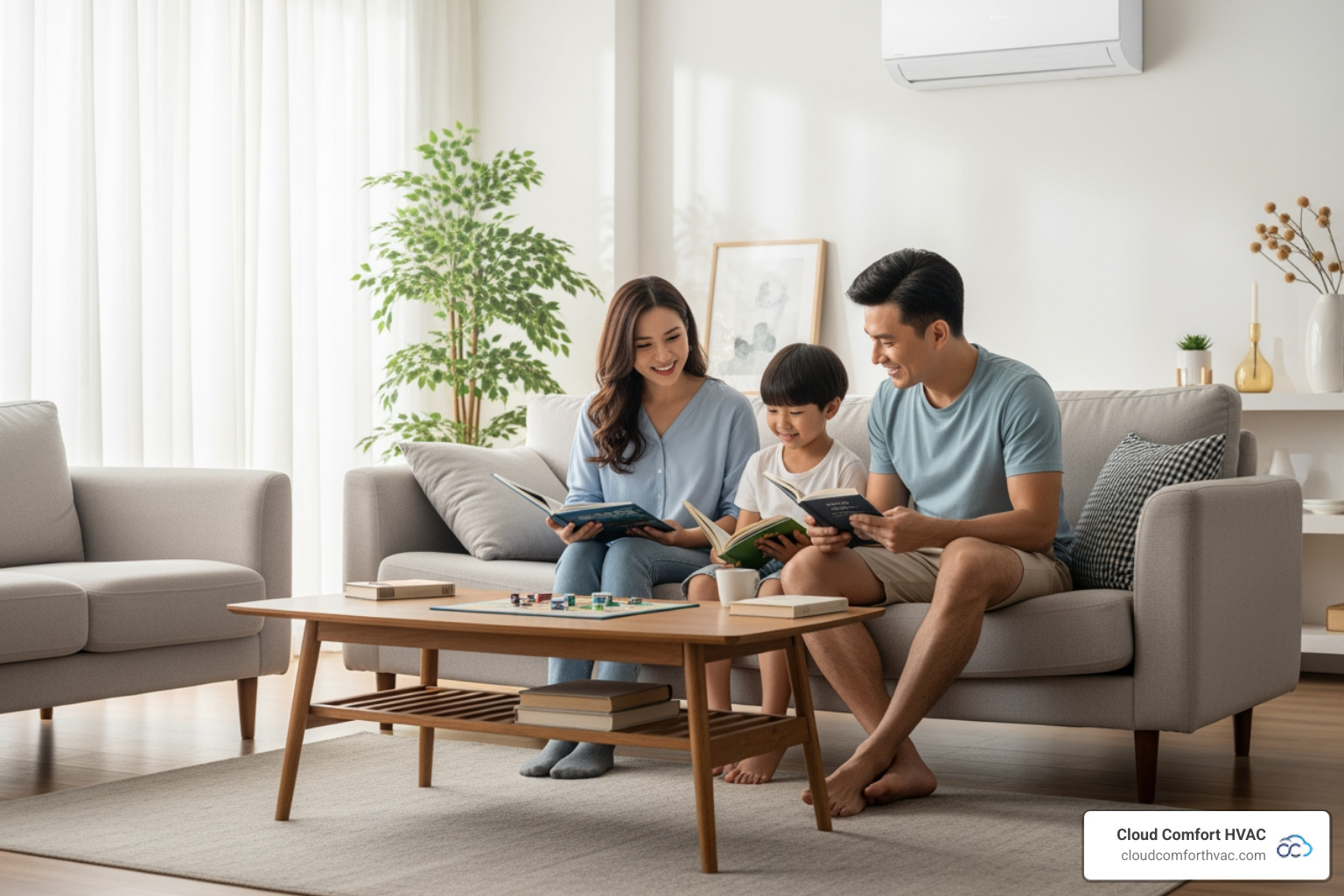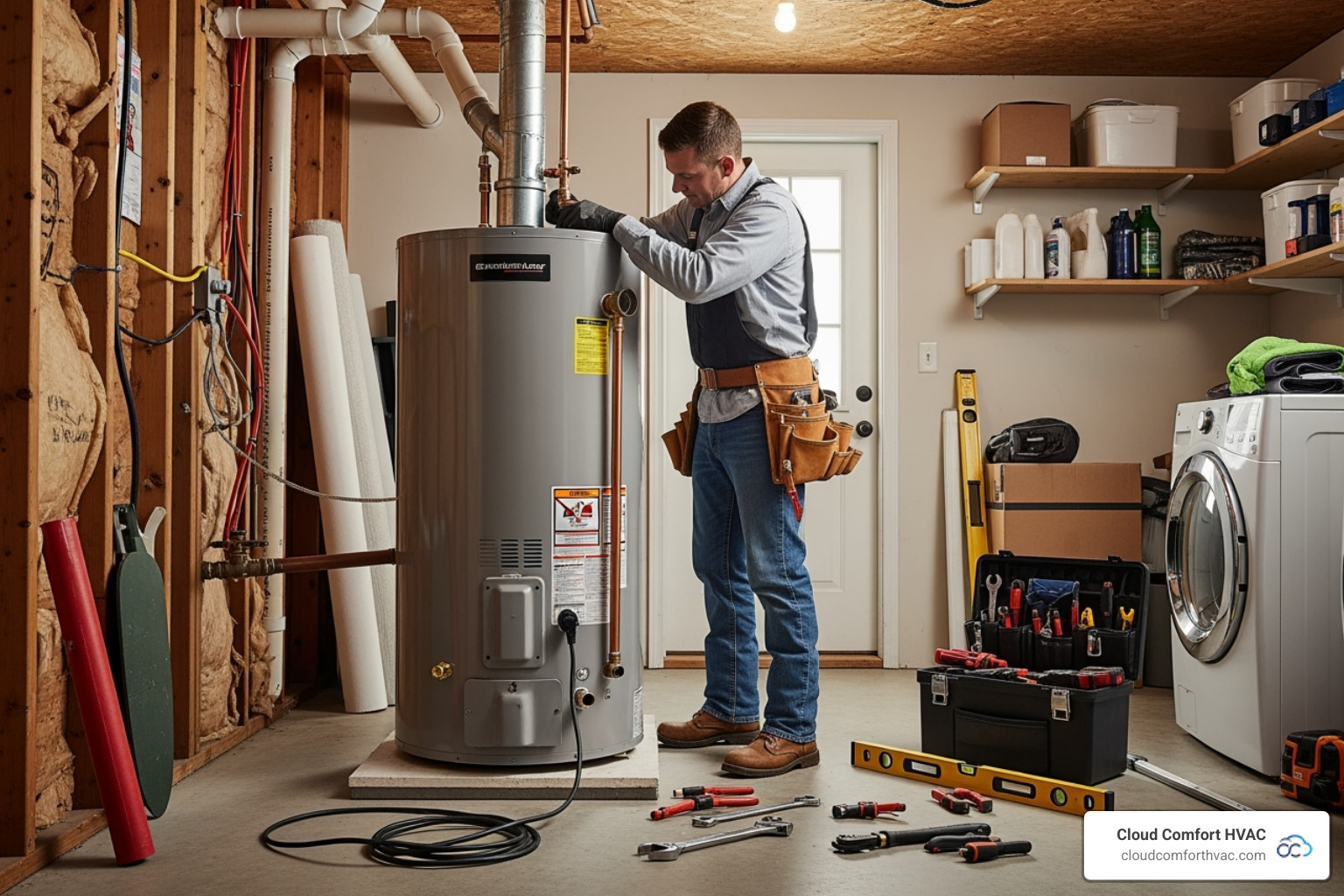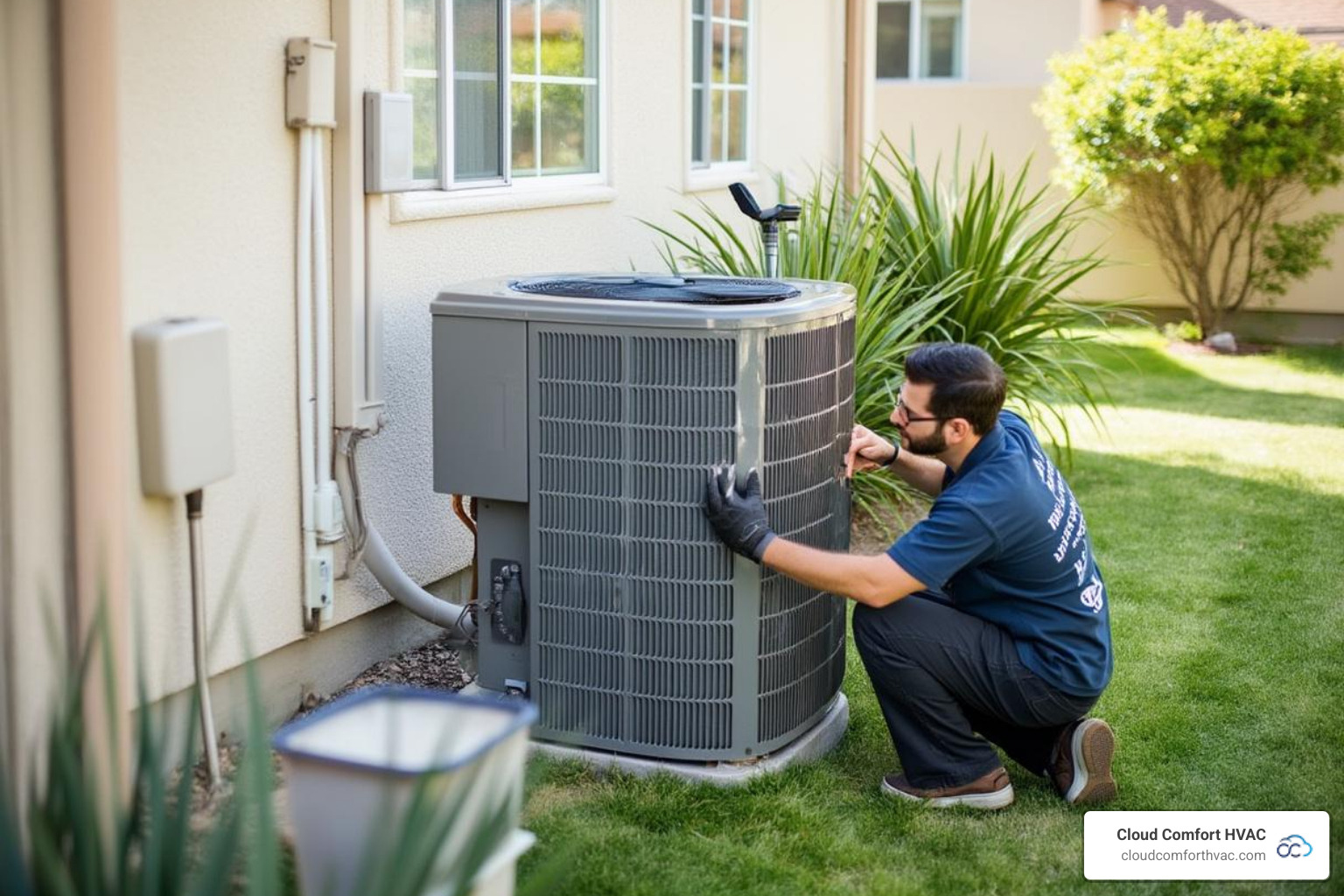Don't Sweat It: A Comprehensive Guide to Diagnosing and Fixing Common AC Problems
Why Your Air Conditioner is Suddenly Your Worst Enemy
Getting a blast of hot air from your AC on a sweltering California day is a frustrating surprise. Instead of cool relief, you're faced with a wave of heat.
Quick Answer: Top 5 Reasons Your AC is Blowing Hot Air
- Thermostat Issues - Set to "heat" or fan set to "on" instead of "auto"
- Dirty Air Filter - Restricts airflow, causes system to overheat
- Frozen Evaporator Coils - Usually from poor airflow or clogged drain
- Low Refrigerant - System can't absorb heat properly
- Tripped Circuit Breaker - Outdoor unit loses power but indoor fan keeps running
The good news is that many of these problems have simple DIY fixes. The bad news is that some, especially those involving refrigerant or electrical components, require professional help.
Your AC doesn't create cold air; it removes heat from inside your home and transfers it outside. If this process is interrupted, you'll get warm air instead of cool.
Most systems leak around 1 ounce of refrigerant per year, and the average AC unit lasts 15-20 years. If your system is acting up, quick action can often prevent a minor issue from becoming a major expense.

Start Here: Simple DIY Troubleshooting Steps
Before calling for help when your AC is blowing hot air, try these simple troubleshooting steps. Often, the fix is surprisingly easy and can restore your comfort without a professional visit.
Check Your Thermostat Settings First
An incorrect thermostat setting is a common and easily fixed culprit. First, check that your thermostat is set to "COOL" mode, not "HEAT." Ensure the temperature is set lower than the current room temperature; a good range is between 60 and 75 degrees.
Next, check the fan setting. "AUTO" is correct, as it only runs the fan when the system is cooling. If it's on "ON," the fan runs constantly, circulating unconditioned air. Finally, check the batteries in older thermostats or ensure smart thermostats have a good Wi-Fi connection and are not glitching.
Inspect the Circuit Breaker
Your AC system uses a lot of power and can trip a circuit breaker. Head to your electrical panel (usually in the garage, basement, or a closet) and look for the breaker labeled "AC" or "HVAC."
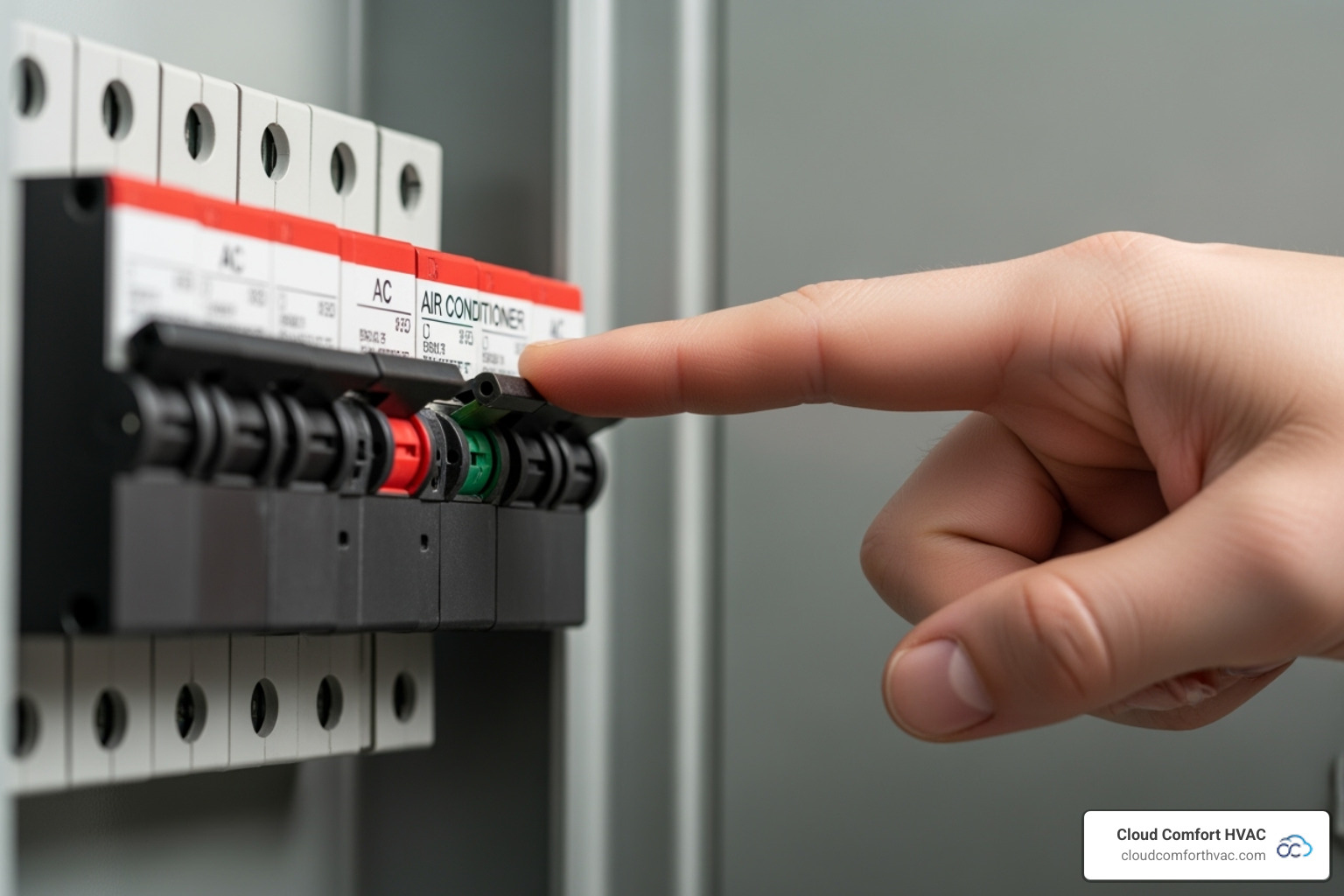
Most systems have two breakers: one for the outdoor unit and one for the indoor unit. If a switch is in the middle or "OFF" position, reset it by pushing it fully to "OFF" and then back to "ON." If the breaker trips again immediately, it signals a larger electrical problem that needs a professional.
Ensure Air Vents Are Clear
Sometimes the issue is just blocked airflow. Walk through your home and check your vents. Ensure no supply vents (where cool air comes out) are blocked by furniture or curtains. Also, check that your larger return air vents are clear and open. Restricted airflow forces your system to work harder and can lead to warm air. For best results, keep all doors and windows closed when the AC is running.
For more helpful tips on keeping your system happy, check out our guide on how to avoid AC repair issues this summer.
Top 7 Reasons Your AC is Blowing Hot Air
If the initial DIY checks didn't solve the mystery of your AC blowing hot air, it's time to look at more common AC issues. These range from simple maintenance oversights to serious mechanical failures. Understanding these culprits can help you know when to call the experts.
Here are the most frequent reasons your AC is giving you warm air instead of cool relief:
- A Dirty or Clogged Air Filter
- Frozen Evaporator Coils
- A Dirty Outdoor Condenser Unit
- Low Refrigerant
- Leaky Air Ducts
- Electrical Issues Beyond the Breaker
- A Malfunctioning Compressor
Let's explore each one so you can get a clearer picture of what might be happening with your system.
1. A Dirty or Clogged Air Filter
This is the most common and easiest fix for an AC blowing hot. Your air filter traps dust and debris, but when it gets clogged, it severely restricts airflow. This forces your system to overwork, leading to overheating and poor cooling.
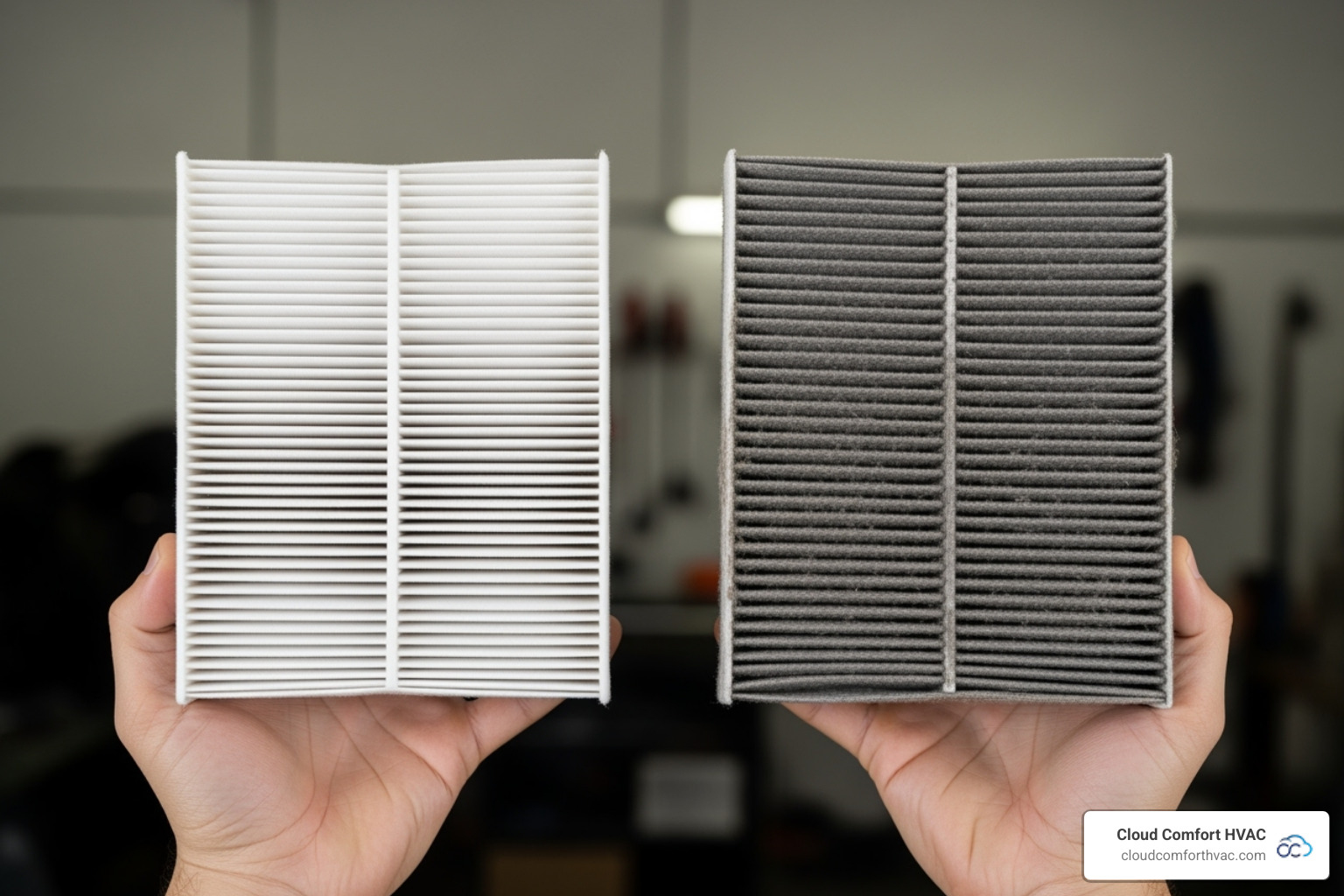
A clogged filter can also cause the evaporator coil to freeze. Check your filter monthly and replace it every 1-3 months (or more often if you have pets or allergies). This simple step is key to an efficient AC and can help you avoid bigger repairs.
For more signs that your AC might be struggling, take a look at our guide on How to Tell When It's Time for an AC Repair: 7 Warning Signs to Watch Out For.
2. Frozen Evaporator Coils
If your filter is clean, check the indoor unit's evaporator coils for ice. These coils absorb heat, but if they get too cold, they can freeze, blocking airflow and stopping the cooling process.
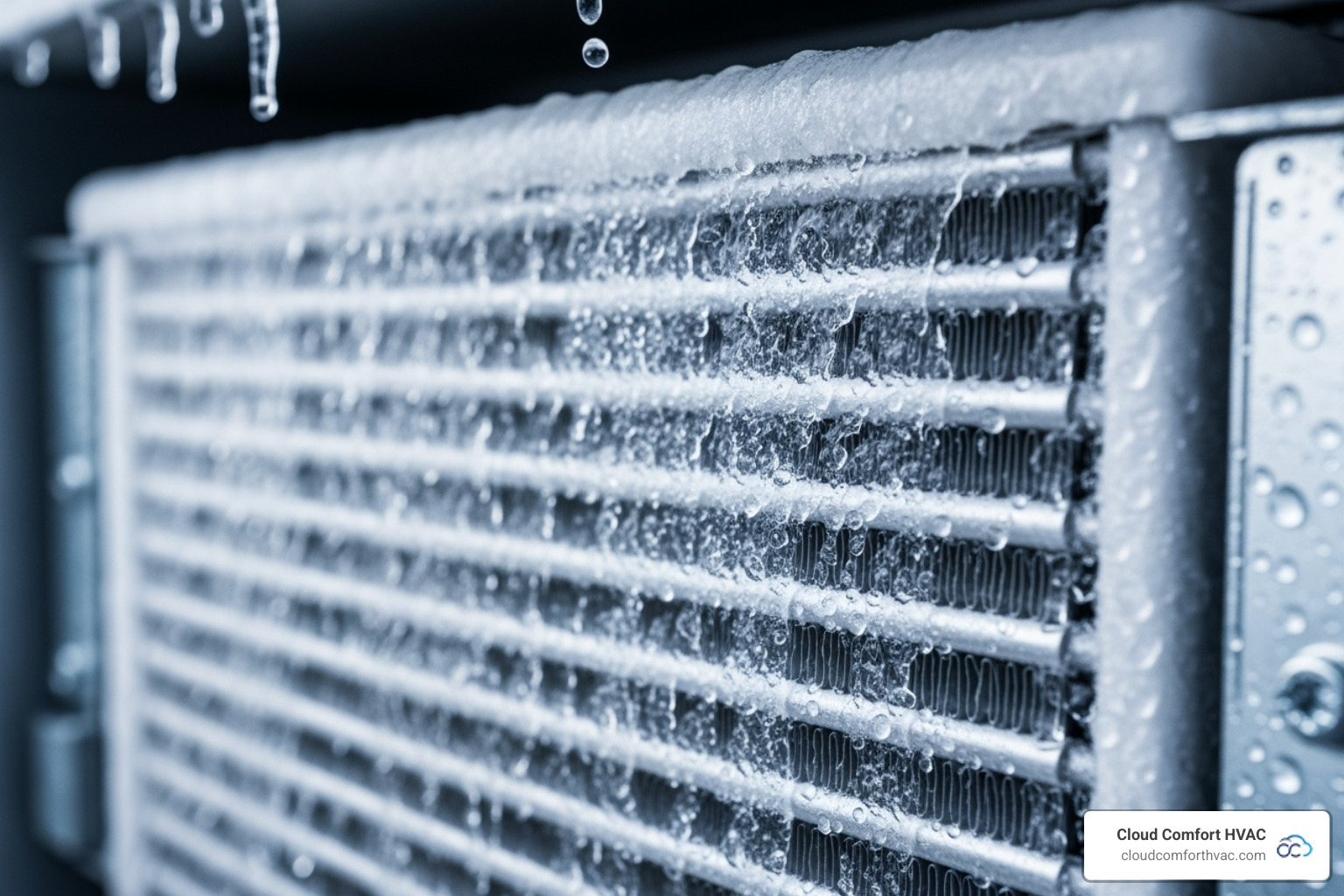
Freezing is usually a symptom of another issue, like poor airflow or low refrigerant. If you see ice:
- Turn off your AC's cooling function immediately.
- Switch your fan setting to "ON" to help melt the ice.
- Let the coils thaw completely. This can take several hours.
- Once thawed, check your air filter again.
If the problem persists, you likely need a professional to fix the underlying cause. Want to know more? Check out our guide: Why is AC Freezing Up in the Summer Heat.
3. A Dirty Outdoor Condenser Unit
Your outdoor unit (the condenser) releases heat absorbed from your home. If its coils are covered in dirt, grass, or leaves, it can't release heat effectively. This makes your system work harder, reduces cooling, and can cause overheating. To clean it, first turn off the power at the circuit breaker. Then, gently spray the coils with a garden hose. Also, ensure there's at least 2 feet of clear space around the unit for proper airflow. For a deeper clean, schedule professional AC Service Torrance, CA.
4. Low Refrigerant: A Common Culprit When Your AC is Blowing Hot Air
Refrigerant is the substance that circulates through your AC to transfer heat. Your system doesn't "use up" refrigerant; if it's low, you have a leak. Without enough refrigerant, your AC can't absorb heat, resulting in warm air from your vents. Signs of a leak include hissing or bubbling sounds or ice on the refrigerant line. Handling refrigerant requires certification and special tools, so this is a job for a qualified HVAC technician. Never attempt to add refrigerant yourself. For more on this, see this resource on The cooling process.
5. Leaky Air Ducts
Your ductwork delivers cool air throughout your home. If there are leaks or gaps in the ducts (especially in attics or crawlspaces), cool air escapes before reaching your rooms. At the same time, warm, unconditioned air can be pulled into the system. This forces your AC to work harder for less effect. While minor leaks can be taped, significant duct issues require professional sealing to restore efficiency. Fixing leaky ducts can make your home more comfortable and energy-efficient. Learn more at Energy Efficient Air Conditioner Torrance, CA.
6. Electrical Issues Beyond the Breaker
If a simple breaker reset doesn't work, the problem could be a more complex electrical issue. Components like capacitors (which start the motors) and contactors (which power the outdoor unit) can fail. Damaged or corroded wiring can also interrupt power. These parts carry high voltage and are dangerous to handle. Attempting a DIY fix is risky and can cause further damage. This work should always be left to a trained HVAC technician. For urgent help, see our 24 Hour AC Repair Torrance, CA services.
7. A Malfunctioning Compressor
The compressor is the heart of your AC, pumping refrigerant through the system. If it fails, the cooling process stops entirely. Signs of a failing compressor include loud grinding or rattling noises from the outdoor unit, the system failing to start, or frequent breaker trips. A broken compressor is one of the most expensive AC repairs. On an older unit, it often makes more financial sense to replace the entire AC system. Learn more with our guide on When to replace vs repair aging AC unit.
When to Call a Professional for Your AC
While DIY tips are helpful, some AC blowing hot air issues require a professional. Knowing when to call an expert is about safety, protecting your AC unit, and ensuring a correct repair. Our technicians have the specialized tools, training, and expertise to safely handle hazardous refrigerants and high-voltage electrical parts. Professional repairs also come with warranties, which a DIY fix won't.

Some AC problems have DIY limitations that can be dangerous. Working with refrigerant requires EPA certification, electrical issues pose serious safety concerns, and many repairs need specialized tools. Attempting DIY repairs on a system still under warranty protection can also void that coverage.
Signs You Need an Expert Immediately
If your AC blowing hot air is accompanied by any of these red flags, call a professional immediately:
- Refrigerant leaks: Hissing or bubbling sounds indicate a leak. Refrigerant is hazardous and requires a certified technician.
- Electrical problems: If the breaker trips repeatedly or you suspect faulty wiring, capacitors, or contactors, do not attempt a repair. High voltage is extremely dangerous.
- Loud mechanical noises: Grinding, squealing, or banging from your outdoor unit signals serious internal damage to parts like the compressor or fan motor.
- AC won't turn on: If the thermostat and breaker are fine but the unit is dead, it's a deeper component failure.
- Burning smells: Turn the system off immediately and call for emergency service, as this is a serious fire hazard.
Choosing the right contractor is key. Our guide on how to find the right heating and cooling contractor in California can help.
The Importance of Regular Maintenance
The best way to prevent your AC blowing hot air is through preventative care. Annual maintenance, ideally in the spring, allows technicians to catch issues early, clean the system for peak efficiency (lowering energy bills), and extend its lifespan. A well-maintained AC unit runs better and lasts longer. Plus, many manufacturer warranties require proof of annual service to remain valid. If you're in the Manhattan Beach area, we can help with our AC Tune Up Manhattan Beach, CA service.
Considering an AC Replacement
The average AC unit lifespan is 15-20 years. If your aging system needs frequent repairs, has declining efficiency (rising energy bills), or uses the phased-out R-22 refrigerant, replacement is often more cost-effective than another repair. Modern units offer significant long-term savings and improved reliability. Our team specializes in energy-efficient installations backed by strong warranties and our 1-year Comfort Promise. For more information, visit our AC Replacement Torrance, CA page.
Frequently Asked Questions about AC Performance
When your AC is blowing hot air, it's natural to have questions. Here are some of the most common concerns we hear.
Why is my AC fan blowing but the air isn't cold?
This common problem occurs when your indoor fan (the blower) is working, but the outdoor unit is not. The cooling process happens outside, so if the condenser or compressor has lost power (tripped breaker) or has a failed part, the fan will simply circulate room-temperature air. The two parts of your system aren't communicating correctly.
How long should an AC cooling cycle last?
A healthy AC should run for 15-20 minutes at a time, 2-3 times per hour on a hot day. If it runs constantly, it's struggling to cool your home, possibly due to low refrigerant or a dirty filter. If it turns on and off every few minutes (short-cycling), it could be oversized or have a faulty part. Both scenarios are inefficient and signal a problem.
Can a clogged drain line cause an AC to blow warm air?
Yes. Your AC removes humidity, which creates condensation. If the drain line clogs, water backs up. Many systems have a safety switch that detects this and shuts off the outdoor unit to prevent water damage. The indoor fan may keep running, but it will blow warm air. The backed-up water can also freeze the evaporator coils, which also stops the cooling process. Regular maintenance can prevent this.
Stay Cool with Expert Help
Dealing with AC blowing hot air is frustrating, especially in the California heat. As we've explored, the reasons can range from simple DIY fixes to complex issues requiring an expert. Problems involving electrical components, refrigerants, or major mechanical parts are best left to trained professionals for safety and reliability.
That's where Cloud Comfort HVAC steps in! We're your trusted partner for expert, eco-friendly HVAC and plumbing services across Southern California, serving communities like Rancho Palos Verdes, Manhattan Beach, Culver City, Torrance, Palos Verdes Estates, and Carson, CA. Our team is dedicated to providing fast, reliable service with transparent pricing and no hidden surprises. Our high Google rating is a testament to our commitment to customer satisfaction. Plus, with strong Daikin warranties and our unique 1-year Comfort Promise, you can enjoy complete peace of mind, knowing your investment is protected and your comfort is our absolute priority. We're all about delivering energy-efficient solutions that not only keep you perfectly cool but also help you save on those monthly energy bills.
So, if your AC is blowing hot air and you've already tried the simple fixes, don't sweat it any longer! Give us a call. Our friendly professionals are ready to restore that refreshing cool air to your home.

.avif)
Customer Testimonials
Hundreds of 5-Star Reviews on Google Show Our Commitment to Customer Satisfaction




New Air Conditoining Unit for as low as $79/mo + Free Wi-Fi Thermostat
(Or As Low As $4,995 as a One-Time Payment)
FINANCE WITH $0 PAYMENTS & 0% INTEREST FOR 12 MONTHS, OAC
Hurry! Offer Ends Soon.



